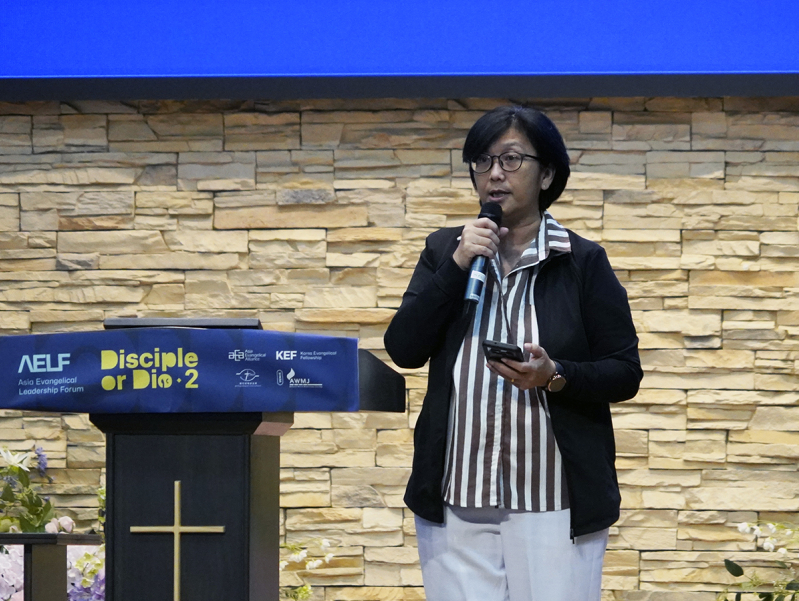
Gwen De Rozario, Executive Director of the Family & Children Commission of the Asia Evangelical Alliance (AEA), presented a detailed strategy report at the Asia Evangelical Leadership Forum in Seoul on Friday (June 13), calling on church leaders across the continent to prioritize family discipleship as a central method for long-term church growth and generational continuity.
Speaking as part of the Children and Family Discipleship thrust—one of four strategic themes at the forum—De Rozario argued that without a shift in mindset and practice regarding the role of families in spiritual formation, the Church risks undermining its own efforts to fulfill the Great Commission. “We must take a long-term view,” she said. “We cannot speak of expanding gospel witness while losing the next generation through inattention to family life.”
The report framed the family not merely as a social institution but as a God-ordained vehicle for discipleship, tracing this principle through scriptural examples including Adam and Eve, Noah’s family, and the lineage of Abraham. “Families matter to God,” De Rozario said. “They have always been integral to how God works through history.”
The presentation defined discipleship as a “life-to-life transfer of beliefs, values, and disciplines,” which De Rozario stated is most naturally cultivated within relational settings—particularly in the home. She contended that churches must equip families to become the primary environment for spiritual formation rather than assuming this function themselves. “Churches must not be the sole providers of discipleship but must act as equipping centers, preparing families to carry out this responsibility at home,” she said.
According to the report, many churches remain highly “church-centric” in practice and teaching, especially in parts of Asia where strong emphasis is placed on biblical instruction within formal church structures. However, De Rozario said this approach often overlooks the significance of everyday faith formation within families. “A Korean pastor once told me, ‘We are Bible-centric and church-centric, but we have forgotten to be family-centric.’”
She emphasized that if local congregations recalibrate their discipleship priorities, they could mobilize significantly more people for sustained witness. “If every church member intentionally discipled others in their home, the multiplication impact would be substantial,” she said, adding that family discipleship has often been a “neglected harvest field.”
The report made the case that current church strategies for growth often fail to account for generational retention. “God is the God of Abraham, Isaac, and Jacob. This means churches need to plan for generational transfer, not only immediate expansion,” she said. De Rozario warned that without a long-term view, churches risk losing continuity in faith between generations.
The strategy presented by De Rozario included a dual approach. In cases where members are new to the faith or come from non-Christian backgrounds, churches should play an active role in initial discipleship. However, once individuals are established in Christ, the emphasis should shift toward equipping them to disciple within their own families. “We must help each believer understand their responsibility before God for their household,” she said.
Currently most churches are still in the early stages of developing this emphasis. “We are still primarily in the awareness and training phase,” De Rozario said. She urged forum participants, many of whom serve as denominational leaders and pastors, to take the message home and advocate for structural changes within their church contexts.
She encouraged leaders to begin by casting vision within their own networks. “If pastors and denominational heads do not understand or support this approach, local implementation is unlikely,” she said. The AEA has already launched the “D6 Asia” platform to promote the collaboration of church and home in discipleship, and De Rozario invited national alliances to adopt similar efforts.
She proposed that local alliances hold at least two annual vision-casting or training events for key leaders to learn about family discipleship and its theological foundation. In addition, De Rozario called on churches to commit to building a “culture of family discipleship,” which includes regular training and contextualized materials.
Another component of the strategy is to build communities of practice. De Rozario explained that at each AEA family conference, pastors and leaders are invited not only to attend workshops but also to reflect on their own families. “We ask leaders to assess their own marriages, their parenting, their needs. Implementation must begin with personal transformation,” she said. According to the report, only after working through family discipleship among leadership should churches move to design broader strategic plans.
She cautioned against launching programs before addressing foundational issues. “Churches should first consider the theological basis for family discipleship and the actual condition of families in leadership,” she said. Once those are addressed, congregations can begin to craft tailored plans based on local needs—whether the priority is parenting, fatherhood, or relational healing.
De Rozario closed her remarks with a reference to the biblical figure Joshua, who declared, “As for me and my house, we will serve the Lord.” However, she pointed out that the opening verses of Judges show that the following generation did not know the Lord or what He had done for Israel. “We must not let this happen in our churches or in our countries,” she said.






